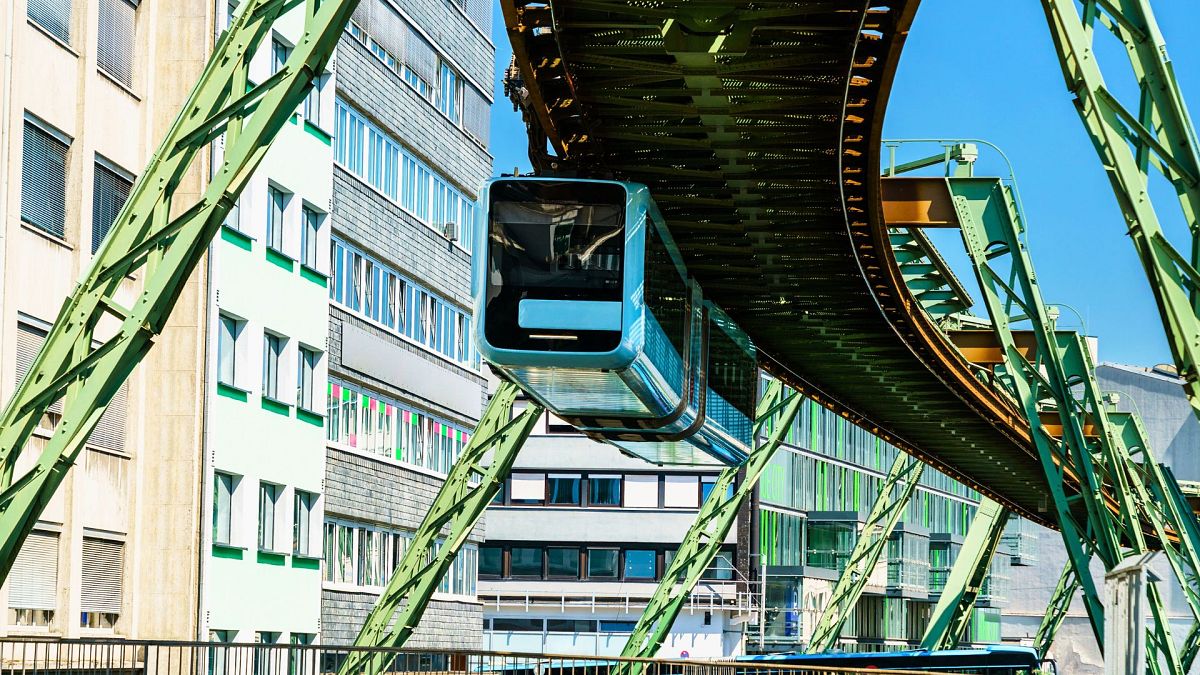When you're on the train trip of a lifetime around Europe, the thrill of riding the rails can run out rather rapidly.
We spent a month Interrailing around the Netherlands, Austria, Switzerland, Germany, Belgium and France, so my family of five felt like we'd experienced everything that train travel had to offer.
But then we headed to Wuppertal, just east of Dusseldorf in Germany, where there's a train treat that will restore the enthusiasm of even the most seasoned rail riders.
Schwebebahn: Wuppertal’s unique suspension railway
It's here you'll find the Schwebebahn, a unique suspension railway where carriages hanging from a central track are transported along the 13 kilometre route, some 12 metres above the river below.
There's even a panoramic window at the back of the train to give you a glimpse of the town down below and the waterway that lends its route to the public transport system.
It was the perfect way to while away a rainy day, as once onboard, you can wend your way from one end of the track to the other without getting wet. It takes about half an hour to ride the route and then you need to disembark while the train loops round through the terminus to head back along the line.
Unlike lots of city transport systems that are a bit tucked away, such as the London Underground, this one's very visible, given the huge green frames that hold the rail above the road and river.
Here the structure and architecture that makes up the Schwebebahn has come to be celebrated and adopted as part of the identity of the city.
Why was Wuppertal picked for this one-of–a-kind public transport system?
The Schwebebahn’s journey actually began 200 years ago this year when Englishman Henry Robinson Palmer designed a system using hanging transport containers pulled by horses, which was trialled in Elberfeld, Germany, two years later.
It took another 80 years before construction work began on the electric system we see today, with the upside-down monorail offered to big cities like Berlin and Munich before being installed in what is now known as Wuppertal.
At the turn of the 21st century, it was three separate towns called Barmen, Elberfeld and Vohwinkel, but within 30 years, the trio had expanded so much, thanks to the Schwebebahn, that they merged to become Wuppertal.
The hard rock that the city is built on meant that an underground system was not possible and the towns were spread along the valley, with most of the busiest buildings near to the river itself. It made sense to install a system that followed the watercourse.
Want to ride the Schwebebahn? Here's what you need to know
Taking the train from Dusseldorf to Wuppertal Hauptbahnhof, where you can connect with the Schwebebahn, takes about 20 minutes. Or you can catch a train from Cologne, which takes between 30 to 45 minutes.
If you're Interrailing, your ticket doesn't cover a trip on the suspension system, in the same way that you can't use it to hop on the Metro in Paris or a bus in Berlin. But there’s still plenty of ticket options, including buying the €49 monthly DeutschlandTicket that covers all local transport like buses, subways, trams, S-Bahns and regional trains throughout Germany.
We bought a €20 ticket that covers 24 hours for up to four people, so you can hop on and off to your heart's content, exploring what else Wuppertal has to offer.
The city’s just been included among a list of the best hidden gems in Europe for 2024 by European Best Destinations, so you'll definitely want to take some time away from the tracks to see what else there is to explore in this lesser known spot.
What else is there to do in Wuppertal?
As well as its unique train system beloved by both tourists and commuters, Wuppertal also lays claim to being the greenest town in Germany, as you’re never more than 10 minutes’ walk from one of its many green spaces.
For outdoor attractions, head to the botanical gardens, der Grüne Zoo Wuppertal or Waldfrieden sculpture park.
Art lovers can visit the Von der Heydt Museum, which includes works from the 17th century onwards from the likes of Cezanne, Monet and Gauguin.
There are two transport museums in the area if your trip on the Schwebebahn has inspired you. The Bergische Museumsbahn runs heritage trams on Saturdays throughout the year and on Sundays over the summer.
At the end of last year, the Schwebodrom opened after three years in the making. This museum is dedicated to telling the story behind the suspension railway, including a virtual reality experience in one of the original carriages, since replaced with a modern upgrade.
There's plenty of fascinating stories over its 125 years in existence, including the time that a circus elephant was being transported in one of the carriages as a publicity stunt in 1950, before panicking, smashing through a window and falling into the river below.
Luckily Tuffi the elephant only suffered minor injuries and went on to live for another 39 years. But the story of her tumble from the train is just one of the Schwebebahn’s memorable moments.
So if you're looking for somewhere that's making a name for itself as a destination with a difference, Wuppertal is well worth a visit.


